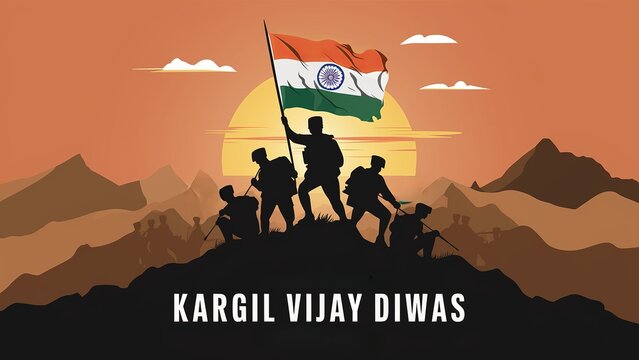The nation is celebrating the Silver Jubilee of the Kargil Vijay Diwas on Friday to commemorate India crushing Pakistan’s misadventure in 1999. In the past 25 years, India has undergone a paradigm shift in many areas after drawing lessons from the Kargil War. Building on that, it will be prudent from the long-term security perspective to connect the past and the present to shape the way for the future.
This is necessary for India, she being the most responsible power in the Indian Ocean Region. Even during the Kargil War, India had exercised the policy of restraint. Though there were suggestions to cross the Line of Control (LoC) taking advantage of the upper hand India had gained with the courage and bravery of the soldiers, India refrained from that. She did not want to stoop to the level of an irresponsible Pakistan that tried to unilaterally alter the LoC. But, India ensured that the posts occupied deceitfully by Pakistan during winter were recaptured so as to scuttle the semi-military neighbour’s plan. India’s responsible behaviour paid big-time. It isolated Pakistan internationally and also devalued its credibility. India’s mature and professional military behaviour (the Indian Army honourably handed over bodies of Pakistani soldiers killed in action to Pakistan, whereas Pakistan had handed over mutilated bodies of Indian soldiers to India) earned her respect among nuclear-powered nations.
Drawing right lessons from the Kargil War of 1999, India has rightfully focussed on ramping up of infrastructure in border areas to ensure ease of movement as and when required. She has invested well in high-altitude warfare training and provision of necessary gears and equipment to the fighting forces. High-altitude capability of the Indian Air Force, and sea-dominating prowess of the Indian Navy have evolved and are taking further strides. While preparing for the possibility of conventional war through three-dimensional readiness, India has been focussing on indigenisation, jointmanship, and dynamic concept of doctrinal thinking. The pursuit of becoming a stronger aerospace power has further strengthened her system of military-diplomatic coordination in other parts of the world.
During the Kargil War, Intelligence failure had become a topic of debate. The fighting forces highlighted Intelligence failure, but the Intelligence apparatus refuted the charges. Following the Kargil Review Committee recommendations, some changes were carried out to ramp up the Intelligence apparatus. But, for long, it remained focussed more on Pakistan than others. Of late, some change has been taking place with focus on China too. But, there is need to deepen the focus on China and Pakistan both, apart from other neighbours considering long-term security perspective. For; the region of Kargil does not face threat from terror-harbouring Pakistan alone. China-Pakistan nexus warrants deeper focus considering that the Communist China has been illegally occupying the area of Aksai Chin, Pakistan has illegally ceded to China a large territory, apart from Pakistan-occupied part of the Indian territory of Kashmir. That the Kargil War was imposed upon India by Pakistan to isolate Siachen and cut off road connectivity to Ladakh, also cannot be relegated to the faded memory.
While preparing for the future based on the understanding of the past and realisation of the present realities, occasions like the Kargil Vijay Diwas should be made more meaningful by making the ordinary Indians aware of all the above aspects. For, the victory on such occasion is not confined to the tales of heroism but also to inspiring ordinary Indians to do extraordinary things in the larger national interest.




